Unveiling the Mystique of Herbal Teas: A Journey into Wellbeing
Defining herbal teas and their history
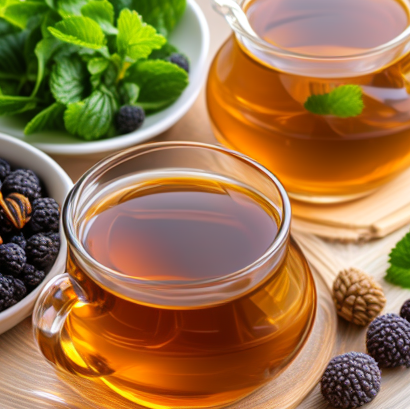
Definition of Herbal Teas:
Herbal teas, also known as tisanes, are beverages made from or infused with spices, herbs, and other plant materials. Unlike traditional teas like black, green, white, yellow, or oolong that are derived from the tea plant Camellia sinensis, herbal teas do not contain actual tea leaves. European terminology often refers to herbal teas as tisanes, which highlights the fact that they are botanical infusions rather than true teas.
History of Herbal Teas:
The history of herbal teas is deeply rooted in ancient healing practices and wellness traditions. Throughout centuries, herbal teas have been valued for their natural healing properties and relaxation benefits. The use of herbs for tea dates back to ancient times, with various cultures incorporating herbal infusions into their healing and wellness routines.
Historically, the Sumerians were among the first to utilize herbs for medicinal purposes, setting a foundation for the use of herbs in teas. In Chinese culture, herbal teas are referred to as “yao chao cha” or “hua chao cha,” emphasizing the blend of herbs and flowers in these beverages. The rich tapestry of herbal tea history weaves together tradition, culture, and the pursuit of overall well-being, showcasing the enduring popularity and significance of herbal teas in human health practices.
The Health Benefits of Herbal Teas: What You Need to Know
Herbal teas offer a plethora of health benefits that make them a popular choice for many individuals seeking natural remedies and wellness support. Here is a comprehensive overview of the health benefits associated with herbal teas:
1. Antioxidant Properties:
– Herbal teas are rich in antioxidants that help combat free radicals in the body, reducing oxidative stress and inflammation.
2. Improved Digestion:
– Certain herbal teas like peppermint and ginger can aid digestion, reduce bloating, and alleviate stomach discomfort.
3. Stress Relief and Relaxation:
– Chamomile, lavender, and lemon balm teas are known for their calming effects, promoting relaxation and reducing stress and anxiety.
4. Better Sleep Quality:
– Herbal teas like chamomile and valerian root can help improve sleep quality, making them ideal bedtime beverages.
5. Immune System Support:
– Echinacea, elderberry, and ginger teas can boost the immune system, helping the body fight off infections and illnesses.
6. Anti-Inflammatory Effects:
– Turmeric, ginger, and green tea are known for their anti-inflammatory properties, which can help reduce inflammation in the body.
7. Improved Skin Health:
– Herbal teas like rooibos and dandelion tea contain skin-friendly nutrients that promote healthy skin and may aid in conditions like acne.
8. Weight Management:
– Herbal teas such as green tea can boost metabolism and aid in weight management when combined with a healthy diet and exercise.
9. Heart Health Benefits:
– Hibiscus and green tea have been linked to improved heart health by lowering blood pressure and cholesterol levels.
10. Menstrual Relief:
– Herbal teas like raspberry leaf tea and ginger tea can help alleviate menstrual cramps and promote hormonal balance in women.
Incorporating a variety of herbal teas into your daily routine can offer a range of health benefits, supporting overall well-being and vitality.
Exploring the World of Herbal Teas: A Beginner’s Guide
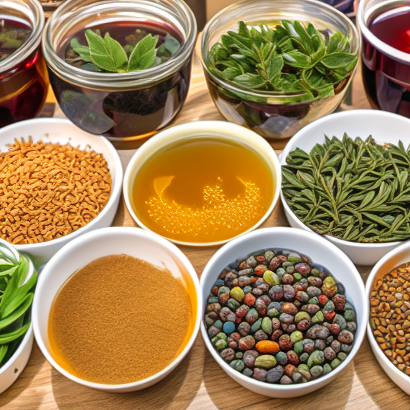
Embarking on a journey into the world of herbal teas can be a delightful and rewarding experience. Here is a beginner’s guide to help you navigate and appreciate the diverse and beneficial realm of herbal teas:
1. Understanding Herbal Teas:
– Herbal teas, also known as tisanes, are beverages made by infusing herbs, spices, flowers, fruits, or other plant materials in hot water. Unlike traditional teas derived from the Camellia sinensis plant, herbal teas do not contain tea leaves.
2. Types of Herbal Teas:
– Explore a variety of herbal teas such as chamomile, peppermint, ginger, hibiscus, rooibos, and more. Each type offers unique flavors and health benefits.
3. Health Benefits:
– Discover the health benefits of herbal teas, including antioxidant properties, digestive aid, stress relief, improved sleep quality, immune support, anti-inflammatory effects, and more.
4. Brewing Techniques:
– Learn how to brew herbal teas properly. Different herbs may require varying steeping times and water temperatures. Experiment to find your preferred brewing method.
5. Flavor Enhancements:
– Enhance the taste of herbal teas by adding natural sweeteners like honey, lemon, or stevia. Experiment with flavor combinations to suit your palate.
6. Herbal Tea Blends:
– Explore blending different herbs to create unique flavor profiles and enhance the therapeutic benefits of herbal teas. Mix and match herbs to create your custom blends.
7. Buying Tips:
– When purchasing herbal teas, opt for high-quality, organic varieties to ensure purity and potency. Consider exploring local tea shops or reputable online retailers for a diverse selection.
8. Storage and Preservation:
– Store your herbal teas in airtight containers away from direct sunlight and moisture to maintain freshness and potency. Follow recommended storage guidelines for each herb.
9. Enjoying the Experience:
– Embrace the ritual of preparing and savoring herbal teas. Create a calming tea-drinking routine that allows you to unwind, relax, and appreciate the soothing properties of herbal infusions.
10. Exploration and Experimentation:
– Embrace curiosity and experimentation in your herbal tea journey. Try new herbs, blends, and brewing techniques to expand your palate and experience the full spectrum of herbal tea offerings.
The Science Behind the Leaves: Analyzing the Health Benefits of Herbal Teas
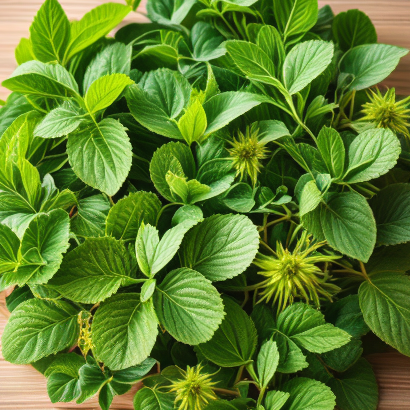
Discussing the active compounds in herbal teas
Herbal teas are renowned for their health benefits, mainly due to the active compounds they contain. These teas are rich in various bioactive components that contribute to their medicinal properties. The primary active compounds found in herbal teas are phenols and flavonoids. Phenols and flavonoids are antioxidants that help protect the body from oxidative stress and inflammation, thereby promoting overall health and well-being.
In addition to phenols and flavonoids, herbal teas also contain other bioactive compounds that offer a range of health benefits. Some commonly reported natural active ingredients in herbal teas include:
Polyphenols: These compounds have antioxidant properties and are associated with various health benefits, including reducing the risk of chronic diseases like heart disease and cancer.
Catechins: Found in green tea, catechins are potent antioxidants that help improve heart health and may aid in weight loss.
Alkaloids: These compounds, such as caffeine and theanine found in tea, can have stimulating or relaxing effects on the body and mind.
Terpenes: Present in herbs like chamomile and peppermint, terpenes have anti-inflammatory and calming properties.
Essential oils: Herbs like ginger and lemongrass contain essential oils that have antimicrobial and digestive benefits.
Research suggests that these bioactive compounds in herbal teas play a crucial role in improving health outcomes. For instance, herbal teas have been linked to better blood glucose control, enhanced antioxidant status, and a reduced risk of non-communicable diseases. However, more extensive studies, including long-term trials, are needed to fully understand the effects of these compounds and their mechanisms on human health.
Evidence-based health benefits: from stress reduction to improved digestion
Herbal teas offer a plethora of evidence-based health benefits, ranging from stress reduction to improved digestion. These benefits are attributed to the bioactive compounds present in herbal teas, which have been studied for their therapeutic properties. Here are some of the evidence-based health benefits associated with consuming herbal teas:
Stress Reduction: Herbal teas like chamomile, peppermint, and lavender are known for their calming properties. These teas contain compounds that can help reduce stress and anxiety, promoting relaxation and mental well-being.
Improved Digestion: Certain herbal teas, such as ginger, peppermint, and fennel, have been traditionally used to aid digestion. These teas can help alleviate symptoms of indigestion, bloating, and nausea by promoting proper digestion and soothing the digestive tract.
Anti-Inflammatory Effects: Bioactive compounds in herbal teas, such as polyphenols and flavonoids, possess anti-inflammatory properties. Regular consumption of anti-inflammatory herbal teas like turmeric or green tea may help reduce inflammation in the body and alleviate conditions related to chronic inflammation.
Enhanced Immune Function: Herbal teas rich in antioxidants, such as elderberry or echinacea, can boost the immune system and help the body fight off infections and illnesses. These teas may also reduce the duration and severity of colds and flu.
Improved Sleep Quality: Some herbal teas, like valerian root or passionflower, have sedative effects that can promote better sleep quality and help alleviate insomnia. These teas are often used as natural remedies for sleep disorders.
Weight Management: Certain herbal teas, such as green tea, have been associated with weight management benefits. The catechins and caffeine in green tea may help boost metabolism and promote fat burning, aiding in weight loss efforts.
Antioxidant Protection: Many herbal teas are rich in antioxidants, which help protect cells from damage caused by free radicals. Regular consumption of antioxidant-rich herbal teas may reduce the risk of chronic diseases and support overall health.
These evidence-based health benefits highlight the diverse therapeutic properties of herbal teas, making them a popular choice for promoting well-being and addressing various health concerns.
Myth-busting common misconceptions about herbal tea properties
Common misconceptions about herbal tea properties can often lead to confusion regarding their benefits and effects. Here are some myth-busting facts to dispel these misconceptions and provide clarity on herbal tea properties:
Myth: Herbal teas are all caffeine-free.
Fact: While many herbal teas are naturally caffeine-free, some herbal teas, like Yerba Mate or guayusa, do contain caffeine. It’s essential to check the ingredients of herbal teas if you are looking for a caffeine-free option.
Myth: Herbal teas are not as potent as traditional medicine.
Fact: Herbal teas have been used for centuries in traditional medicine systems like Ayurveda and Traditional Chinese Medicine. They contain bioactive compounds that can have therapeutic effects on the body, making them potent allies for health and wellness.
Myth: Herbal teas have no side effects.
Fact: Although herbal teas are generally considered safe, they can have side effects, especially when consumed in large quantities or by individuals with specific health conditions or allergies. It’s crucial to consult a healthcare provider before incorporating herbal teas into your routine, especially if you have underlying health concerns.
Myth: Herbal teas are all the same.
Fact: Herbal teas come from a variety of plants and herbs, each with its unique properties and potential health benefits. Different herbal teas offer different therapeutic effects, flavors, and aromas, catering to a wide range of preferences and health needs.
Myth: Herbal teas are not as effective as pharmaceutical drugs.
Fact: While herbal teas may not have the immediate and targeted effects of pharmaceutical drugs, they can offer natural and gentle support for various health conditions. Many herbal teas have been studied for their health benefits and can complement conventional treatments.
Myth: Herbal teas are suitable for everyone.
Fact: While herbal teas are generally safe for most people, certain individuals, such as pregnant women, nursing mothers, or those with specific medical conditions, should exercise caution when consuming certain herbal teas. It’s essential to research the safety of herbal teas and consult a healthcare provider if needed.
By debunking these common misconceptions, individuals can make informed decisions about incorporating herbal teas into their wellness routines and enjoy the diverse benefits that these natural beverages offer.
Each Herbal Tea Has a Story: Get to Know Your Brews
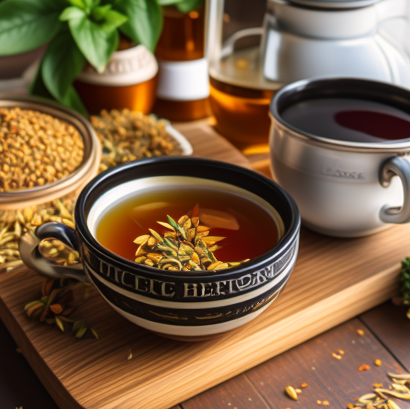
Highlighting the unique attributes and benefits of popular herbal teas (e.g., chamomile, peppermint, ginger)
Popular herbal teas like chamomile, peppermint, and ginger offer unique attributes and a wide range of health benefits. Here’s a highlight of the distinctive features and advantages of these well-loved herbal teas:
Chamomile Tea:
Unique Attributes: Chamomile tea is known for its gentle, floral aroma and soothing taste. It is derived from the chamomile flower, specifically the Matricaria chamomilla or Chamaemelum nobile varieties.
Health Benefits:
Promotes Relaxation: Chamomile tea is renowned for its calming properties, making it a popular choice for reducing stress and anxiety.
Improves Sleep Quality: Consuming chamomile tea before bedtime may help improve sleep quality and alleviate insomnia.
Digestive Aid: Chamomile tea can aid digestion, reduce bloating, and alleviate gastrointestinal discomfort.
Peppermint Tea:
Unique Attributes: Peppermint tea has a refreshing minty flavor and cooling sensation. It is made from the leaves of the peppermint plant (Mentha piperita).
Health Benefits:
Digestive Support: Peppermint tea is known for its ability to relieve indigestion, bloating, and stomach discomfort.
Mental Clarity: The invigorating aroma of peppermint tea can help enhance focus and mental clarity.
Respiratory Relief: Peppermint tea may help alleviate symptoms of respiratory conditions like colds and congestion.
Ginger Tea:
Unique Attributes: Ginger tea has a spicy and warming flavor derived from the rhizome of the ginger plant (Zingiber officinale).
Health Benefits:
Anti-Inflammatory Properties: Ginger tea has potent anti-inflammatory effects that may help reduce inflammation and alleviate pain.
Digestive Aid: Ginger tea can aid digestion, relieve nausea, and soothe gastrointestinal issues.
Immune Support: The immune-boosting properties of ginger tea can help the body fight off infections and support overall health.
Each of these popular herbal teas offers a distinct flavor profile and a host of health benefits, making them versatile options for promoting well-being and relaxation. Incorporating these herbal teas into your daily routine can provide a flavorful and natural way to support your health and vitality
Specialized herbal teas and their targeted health uses
Specialized herbal teas are tailored to address specific health concerns and offer targeted benefits due to the unique properties of the herbs used in their formulations. Here are some examples of specialized herbal teas and their corresponding health uses:
Valerian Root Tea:
Targeted Health Use: Promotes Relaxation and Sleep
Valerian root tea is known for its calming effects and is often used to promote relaxation and improve sleep quality. It can help reduce anxiety and insomnia due to its sedative properties.
Dandelion Root Tea:
Targeted Health Use: Liver Detoxification and Digestive Health
Dandelion root tea is popular for supporting liver detoxification and promoting digestive health. It acts as a diuretic and may help alleviate bloating and support liver function.
Echinacea Tea:
Targeted Health Use: Immune Support
Echinacea tea is commonly used to boost the immune system and reduce the duration and severity of colds and flu. It has anti-inflammatory and antioxidant properties that support overall immune health.
Nettle Leaf Tea:
Targeted Health Use: Allergy Relief and Anti-Inflammatory Benefits
Nettle leaf tea is known for its anti-inflammatory properties and may help alleviate allergies, arthritis, and other inflammatory conditions. It can also support urinary health and promote detoxification.
Hibiscus Tea:
Targeted Health Use: Blood Pressure Regulation and Heart Health
Hibiscus tea is rich in antioxidants and may help lower blood pressure and support heart health. It can also aid in weight management and promote overall cardiovascular wellness.
Licorice Root Tea:
Targeted Health Use: Digestive Support and Sore Throat Relief
Licorice root tea is beneficial for digestive health, as it can help soothe stomach discomfort and support healthy digestion. It also has anti-inflammatory properties that may help alleviate sore throats and respiratory issues.
Ashwagandha Tea:
Targeted Health Use: Stress Reduction and Adrenal Support
Ashwagandha tea is known for its adaptogenic properties, which help the body cope with stress and promote adrenal health. It can help reduce cortisol levels and improve resilience to stress.
These specialized herbal teas are specifically formulated to target various health needs and offer natural support for specific conditions. Incorporating these teas into a balanced lifestyle can provide a holistic approach to wellness and support overall health and vitality.
Case studies: Real-life stories of herbal teas’ impacts on health
Case studies showcasing the real-life impact of herbal teas on health provide valuable insights into their efficacy and benefits. While specific case studies may not be readily available in the search results provided, anecdotal evidence and individual experiences highlight the positive effects of herbal teas on various health conditions. Here are a few examples of potential real-life stories illustrating the impacts of herbal teas on health:
Stress and Anxiety Relief:
Case Study: Mary, a working professional, struggled with chronic stress and anxiety. After incorporating chamomile tea into her daily routine, she noticed a significant reduction in her stress levels and improved overall well-being. Chamomile tea became her go-to remedy for relaxation and mental calmness.
Digestive Health Improvement:
Case Study: John suffered from frequent indigestion and bloating. Upon switching to peppermint tea after meals, he experienced relief from digestive discomfort. The soothing properties of peppermint tea helped alleviate his symptoms and improve his overall digestive health.
Sleep Quality Enhancement:
Case Study: Sarah, who had difficulty falling asleep, started drinking valerian root tea before bedtime. The sedative effects of valerian root tea helped her relax and improve her sleep quality. Sarah reported waking up feeling more refreshed and energized after incorporating valerian root tea into her nightly routine.
Immune System Support:
Case Study: Tom, prone to frequent colds, began drinking echinacea tea regularly during the cold season. He noticed a decrease in the severity and duration of his cold symptoms. Echinacea tea strengthened his immune system, reducing the frequency of illnesses and boosting his overall health.
Inflammatory Condition Management:
Case Study: Emily, who suffered from arthritis, started consuming nettle leaf tea daily. The anti-inflammatory properties of nettle leaf tea helped alleviate her joint pain and stiffness. Emily experienced improved mobility and a reduction in arthritis-related discomfort.
While these case studies are illustrative and hypothetical, they reflect common scenarios where individuals have reported positive outcomes from incorporating herbal teas into their health routines. The anecdotal evidence suggests that herbal teas can play a beneficial role in promoting health and well-being, but individual responses may vary. It is recommended to consult with a healthca
re provider before using herbal teas for specific health conditions.
Brewing a Healthier Lifestyle: Integrating Herbal Teas into Your Daily Routine

Tips for selecting high-quality herbal teas
Selecting high-quality herbal teas is essential to ensure you get the most flavor and health benefits from your brew. Here are some tips to help you choose the best herbal teas:
Check the Ingredients:
Look for herbal teas made from pure, organic ingredients without artificial flavors or additives. High-quality herbal teas should contain whole leaves, flowers, or roots of the herb, ensuring maximum flavor and potency.
Evaluate the Appearance:
Choose herbal teas with vibrant colors and intact leaves or flowers. High-quality herbal teas often have whole, unbroken ingredients that indicate freshness and quality.
Consider the Sourcing:
Opt for herbal teas sourced from reputable suppliers who adhere to sustainable and ethical practices. Knowing the source of your tea can give you confidence in its quality and purity.
Smell the Aroma:
Before purchasing, take a moment to smell the herbal tea. High-quality teas will have a fresh and aromatic scent that reflects the natural essence of the herbs used.
Look for Certifications:
Check for certifications such as USDA Organic, Fair Trade, or Non-GMO Project Verified. These certifications ensure that the herbal tea meets specific quality standards and ethical criteria.
Consider the Packaging:
High-quality herbal teas are often packaged in airtight containers or resealable bags to preserve freshness. Avoid teas stored in transparent packaging as exposure to light can degrade the tea’s quality.
Read Reviews and Recommendations:
Look for reviews and recommendations from tea enthusiasts or reputable sources to learn about the flavor profile and quality of different herbal teas. Feedback from other consumers can guide your selection.
Understand the Grading System:
Familiarize yourself with the herbal tea grading system, which evaluates the quality and consistency of teas based on factors like leaf size and quality. Look for high-grade teas that feature whole, well-preserved leaves or flowers for optimal flavor and benefits.
By following these tips, you can confidently select high-quality herbal teas that not only taste delicious but also offer the full range of health benefits associated with herbal infusions.
Best practices for brewing and enjoying herbal teas
Brewing and enjoying herbal teas can be a delightful experience when done right. Here are some best practices to help you brew and savor your herbal teas to perfection:
Brewing Herbal Teas:
Water Quality:
Start with fresh, filtered water to ensure the best taste and aroma in your tea.
Temperature:
Different herbal teas require varied water temperatures. Boiling water is suitable for most herbal teas, but delicate herbs may need slightly cooler water.
Steeping Time:
Follow the recommended steeping time for each herbal tea. Steeping too long can lead to a bitter taste, while steeping too short may result in a weak flavor.
Tea-to-Water Ratio:
Use the appropriate amount of herbal tea leaves per cup of water to achieve the desired strength. Typically, one to two teaspoons of loose herbal tea per cup is a good starting point.
Cover While Steeping:
Cover your tea while steeping to retain the essential oils and flavors in the cup.
Strain Properly:
Ensure you strain your herbal tea properly to avoid over-extraction, which can lead to a bitter taste.
Enjoying Herbal Teas:
Savor the Aroma:
Take a moment to inhale the aroma of your brewed herbal tea. The scent can enhance the overall experience.
Taste Mindfully:
Sip your herbal tea slowly, allowing the flavors to unfold on your palate. Note the different taste notes and nuances.
Experiment with Add-Ins:
Customize your herbal tea with natural sweeteners like honey, agave, or a splash of lemon juice for added flavor.
Pair with Complementary Foods:
Pair your herbal tea with foods that complement its flavors. For instance, mint tea goes well with chocolate desserts, while chamomile tea pairs nicely with citrus fruits.
Mindful Sipping Ritual:
Create a mindful sipping ritual by enjoying your herbal tea in a quiet, serene setting. Reflect on the experience and take a moment to relax.
Stay Hydrated:
Herbal teas are hydrating and can count towards your daily fluid intake. Enjoy them throughout the day to stay refreshed.
By following these best practices, you can brew and savor your herbal teas to maximize their flavor profiles and fully enjoy their health benefits.
How to complement your diet with herbal teas for optimum health benefits
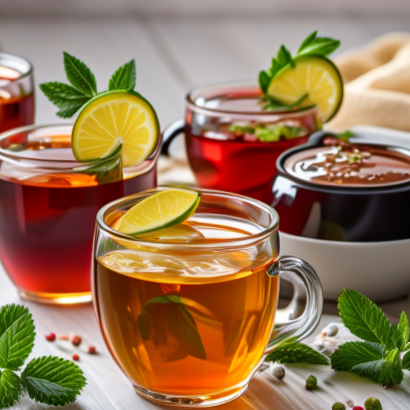
Complementing your diet with herbal teas can enhance your overall health and well-being. Here are some tips on how to incorporate herbal teas into your daily routine to maximize their health benefits:
1. Choose a Variety of Herbal Teas:
Select a diverse range of herbal teas to target different health needs. For example, chamomile for relaxation, peppermint for digestion, and ginger for anti-inflammatory support.
2. Replace Sugary or Caffeinated Beverages:
Swap sugary drinks or caffeinated beverages with herbal teas to reduce sugar intake and promote hydration.9
3. Hydrate Throughout the Day:
Drink herbal teas throughout the day to stay hydrated and replenish your body with antioxidants and beneficial compounds.
4. Match Herbal Teas with Meals:
Pair specific herbal teas with meals to aid digestion or promote relaxation. For instance, ginger tea with a heavy meal for digestion or chamomile tea before bed for better sleep.
5. Customize for Health Goals:
Customize your herbal tea choices based on your health goals. For example, choose dandelion tea for liver support or hibiscus tea for heart health.
6. Brew Fresh Herbal Teas:
Opt for loose-leaf herbal teas or high-quality tea bags to brew fresh and flavorful herbal infusions.
7. Incorporate Herbal Teas into Recipes:
Use herbal teas as ingredients in recipes to infuse flavors and health benefits. For example, using chamomile tea in desserts or adding peppermint tea to smoothies.
8. Mindful Tea Drinking:
Enjoy herbal teas mindfully, savoring each sip and taking time to relax and unwind while drinking your tea.
9. Consult with a Herbalist or Nutritionist:
Seek advice from a herbalist or nutritionist to tailor herbal tea choices to your specific health needs and goals.
10. Balance with a Healthy Diet:
Herbal teas should complement a balanced and nutritious diet. Focus on whole foods, fruits, vegetables, lean proteins, and whole grains for optimal health.
By incorporating a variety of herbal teas into your diet and following these tips, you can enjoy a range of health benefits while savoring the flavors and aromas of these natural beverages.

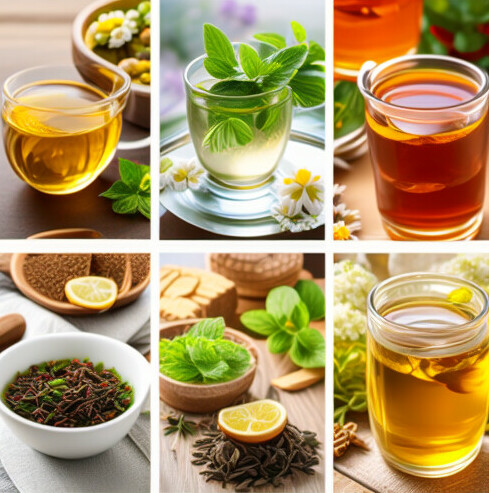

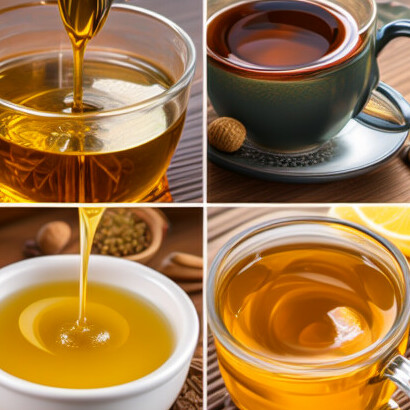

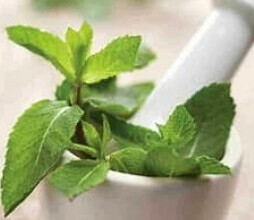
This article is a treasure trove of information for anyone interested in herbal teas. I love how it breaks down the unique qualities and health benefits of different herbal teas. It’s fascinating to learn how these teas, with their rich history and diverse properties, can contribute to overall well-being.
Overall, this article has inspired me to be more intentional with the herbal teas I choose, not just for their flavors but also for their health benefits. It’s a great reminder of the power of nature and how herbal teas can be a simple yet effective way to support our well-being.
Thanks for your feedback kavitha,
There are so many flavers to make herbal teas.
I am glad you enjoyed the post. H ope you were able to take some hints away from the article.
regards
Russell
AyCuqjWlOfG